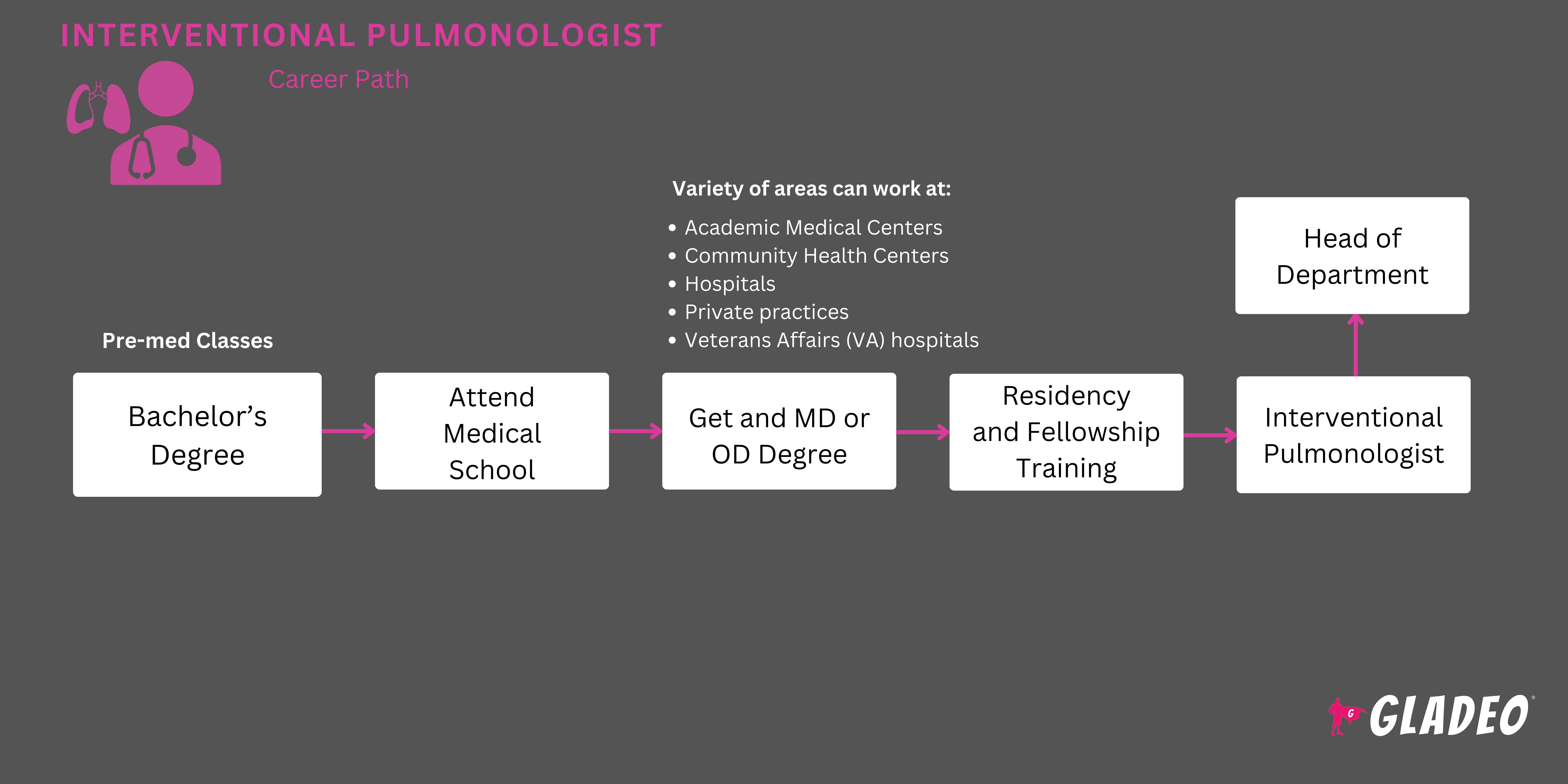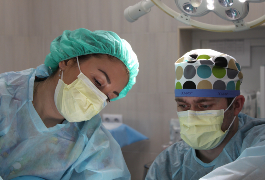Spotlights
Pulmonary Interventionalist, Pulmonary Proceduralist, Interventional Respiratory Specialist, Thoracic Interventionalist, Pulmonary Intervention Physician, Interventional Bronchoscopist, Minimally Invasive Pulmonologist, Interventional Pulmonary Care Specialist, Pulmonary Endoscopist, Pulmonary Interventional Radiologist
Pulmonologists are internal medicine doctors who specialize in diagnosing and treating respiratory system issues, from a patient’s windpipe all the way down into their lungs. They may also treat specific diseases, such as asthma, pulmonary fibrosis, or chronic obstructive pulmonary disease (COPD), as well as any other illnesses or problems causing breathing difficulty. In addition to these experts, the field has a subspecialty for Interventional Pulmonologists.
Since the respiratory system is so complex and tied into other bodily systems, Interventional Pulmonologists often work as part of a larger healthcare team that includes a patient’s cardiologist, respiratory therapists, cancer specialists, and others. They rely on a wide range of evaluation and testing procedures such as flexible bronchoscopy and bronchoalveolar lavage to diagnose issues before devising an individualized course of treatment. Treatment might involve a patient taking medications, going to therapy or rehabilitation, or even undergoing surgery.
- Assisting patients struggling with life-impacting breathing difficulties
- Working with a broader healthcare team to provide comprehensive treatment
- Helping patients avoid invasive surgery when possible
- Potentially saving lives by diagnosing and treating or referring patients facing severe issues
Working Schedule
- Interventional Pulmonologists work full time, at least 40 hours a week with shifts extending longer when needed. They may also work on call to respond to emergencies.
Typical Duties
- Diagnose and treat problems, illnesses, and chronic lung diseases using various procedures or reviews of previous procedures
- Procedures may include: flexible bronchoscopy, bronchoalveolar lavage, biopsies of lung or lymph nodes, bronchial stents, balloon bronchoplasty, rigid bronchoscopy, pleurodesis, pleuroscopy, thoracentesis, indwelling pleural catheter, bronchoscopic thermoplasty, and foreign body removal
- Performing endobronchial ultrasound probes, electromagnetic navigation bronchoscopy, argon plasma coagulation, endobronchial cryotherapy and biopsy, laser treatment, microknife treatment, valve and stent placement
- Reviewing results of spirometry breathing tests, bloodwork, and sleep studies
- Examining chest X-rays, CT scans, and other scans for signs of airway compression or stricture, tumors, cancer, tuberculosis, amyloidosis, polychondritis, papillomatosis, granulomatosis, fibrosing mediastinitis, and other problems
- Assessing patients with chronic coughs or who are coughing up blood or have liquid build-up in their lungs
- Tracheostomy tube placement
Additional Responsibilities
- Collaborate with healthcare team members to review findings and discuss treatment options
- Stay current on the latest trends, technologies, and procedures
- Train assistants or other aides, as applicable
- Participate in the larger pulmonology community by attending events and publishing research or conducting peer reviews
Soft Skills
- Ability to explain complicated findings in understandable terms
- Active listening skills and attention-to-detail
- Analytical and objective
- Aptitude for critical thinking and problem solving
- Compassionate and sensitive to the concerns of others
- Empathy and patience
- Investigative
- Professional demeanor
- Research skills
- Resilience and composure
- Resourcefulness and leadership
- Sound judgment and decision-making, sometimes under pressure
- Strong technical reading skills
Technical Skills
- Critical thinking
- Knowledge of medical and electronic medical record software
- Deep familiarity with all applicable instruments and technologies used in the field (see Typical Duties above for a partial listing)
- Applicable understanding of biology and internal medicine
- Knowledge of personal protective equipment usage
- Hospitals and healthcare settings
- Private clinics or doctors’ offices
- Academic institutions
Interventional Pulmonologists have a lot riding on their shoulders and must maintain skills proficiency requiring training on new technology and techniques. Staying current allows them to offer the best patient care possible, through continual reading and learning, in addition to ongoing practice and collaboration with fellow healthcare professionals.
Aside from the technical aspects of the job, workers in this field must be very good at explaining diagnoses and courses of treatment with patients and their families, in a way that they understand what actions to take. IP doctors must also take care to ensure their own safety when treating patients who may carry infectious diseases such as COVID-19, which can be readily spread via airborne droplets.
Interventional Pulmonologists work in one of the many professions that will remain vital in the foreseeable future because of their highly specialized, life-saving skills. Lung cancer, which accounts for almost 3 million global deaths every year, continues to be a prevailing factor driving the need for pulmonology medical services and related equipment. Other health issues such as chronic obstructive pulmonary disorders are also on the rise, further contributing to the demand for Interventional Pulmonology.
As the technology continues to advance, doctors in this field are increasingly able to help patients avoid more invasive surgeries, helping shorten recovery time and mitigate costs. In turn, this invites opportunities for further research which is often funded by the government and key corporate players in the market. Doctors should not only stay current but strive to be involved with advancing diagnostic and therapeutic procedures.
Interventional Pulmonologists operate in a still relatively new sub-specialty of pulmonary medicine. They’re inquisitive and intrepid, ready to push the envelope to develop better ways to treat patients. Most likely this curiosity has long been part of their personality!
They probably always had a keen interest in science and biology, as well as a desire to help others in their times of greatest need. In other words, compassion and empathy are huge motivational factors that drive many people into this emerging, cutting-edge line of work.
- Interventional Pulmonologists require an MD (allopathic doctor) or DO (osteopathic doctor) degree
- Degrees should be from an ACGME-accredited program
- They also need to complete an IP residency and fellowship training in pulmonary and critical care
- Options for this training include:
- 3-year combined Pulmonary and Critical Care Training programs
- 24-month Pulmonary Medicine training
- Critical Care training
- The above may include knowledge-based and procedural training with hands-on instruction and simulations, as well patient observations, discussions, and consulting within medical facilities
- Active, licensed doctors then need to obtain their IP license by passing the IP Board Certification exam
- Look for universities with strong reputations and high-ranking medical programs
- Accreditation by the Accreditation Council for Graduate Medical Education (ACGME) is important for getting licensed
- Review U.S. News’ Best Medical School rankings to learn more about schools and programs
- Carefully review each programs’ website to learn about enrollment data, cost of tuition, scholarship opportunities, current research, and applicable student organizations
- Pay attention to who your faculty members would be. You want to learn from the best, so read their CVs to learn about their publication history, funded research, and awards
- For students considering online options, make sure you live close enough that you can complete your long residency and other in-person requirements when the time comes
- Load up on biology and medical courses in high school to prepare for your long college path to becoming a doctor!
- In college, work closely with your academic advisors to carefully map out your plan of action and ensure you stay on track through the complex process of getting your degree
- Make sure your advisors fully understand your specific goals and know how to help you plan ahead to meet them, because new advisors may not always be up to speed
- Pulmonology is not a job for the squeamish, so be mentally ready for the practical hands-on training you’ll need to pass
- Residency will keep students busy, but to prepare for the hectic pace, consider seeking work experience or possible volunteer opportunities in healthcare/clinical settings
- Develop your soft skills, including professional communications, team-building, and leadership
- Keep track of everything you do on your CV; otherwise, it is hard to go back and look for dates and information
- Always work on your professional network and engage with applicable organizations

- Well-qualified Interventional Pulmonologists should have no trouble finding work after all training and certification is completed. They may even have their jobs lined up before finishing!
- Work with your school or hospital where you did training to seek out opportunities
- Advertise to your professional network when you are ready to enter the job market!
- Fill out your entire LinkedIn profile and invite connections! Per CNBC, up to 80% of jobs are found by using your network
- Talk with former supervisors and professors about their willingness to serve as references; they might even have tips about new openings coming up soon!
- Carefully review openings to ensure you meet all listed speciality qualifications or experience requirements
- List training, work history, publications, and other achievements on your polished CV and have an editor or resume writer review it
- Hone your interview skills by reading doctor-specific sample interview questions
- Stay up-to-date on the latest developments, in case you get a curveball question in an interview
- Interventional Pulmonologists are already pretty high up the ladder, but there is always room for advancement
- Specialization is the key to moving up within many careers, and IP is no different
- Doctors may also want to take on increased responsibilities as administrators or leads where they work
- Always maintain an impeccable work ethic and demonstrate dedication to performance
- Strong teamwork and interpersonal skills are critical to getting ahead without stepping on toes
- Keep patients satisfied. Go above and beyond to make them and their families as informed and as comfortable as possible
- Stay on top of new developments, offer suggestions for improvements, and lead change
- Train staff and cultivate good relations with nurses, doctors, and other team members
- Stay highly engaged in professional organizations, give lectures, publish research, and train others as you build your reputation
- For those with an entrepreneurial inclination, opening one’s own practice can be a lucrative, though stressful, endeavor to think about!
Websites
- American Association for Bronchology and Interventional Pulmonology (AABIP)
- Johns Hopkins Interventional Pulmonology
- Association of Interventional Pulmonary Fellowship Directors (AIPPD)
- American College Chest Physicians (ACCP)
- World Association for Bronchology and Interventional Pulmonology (WABIP)
- The American Thoracic Society
- ACGME Accreditation Data System
- American Medical Association FREIDA database
Books
- Principles and Practice of Interventional Pulmonology, by Armin Ernst and Felix Herth
- Interventions in Pulmonary Medicine 2nd ed., by Jose Pablo Díaz-Jimenez and Alicia Rodriguez
- Netter's Correlative Imaging: Cardiothoracic Anatomy, by M.D. Gotway, et. al.
- Advances in Interventional Pulmonology (Frontiers in Respiratory Medicine), by Ali Musani, et. al.
There are a wide range of career options for those interested in pursuing a medical degree. If pulmonology isn’t up your ally, consider some of the many alternatives, such as:
- Anesthesiology
- Cardiology
- Dentistry
- Dermatology
- Emergency Medicine
- Family Medicine
- Neurology
- OB/GYN
- Optometry
- Pathology
- Psychiatry
Newsfeed

Featured Jobs

Online Courses and Tools







